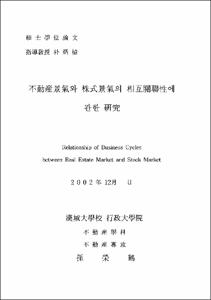不動産景氣와 株式景氣의 相互關聯性에 관한 硏究
= Relationship of Business Cycles between Real Estate Market and Stock Market
- Files in This Item:
-
-
Download
 000000066196.pdf
기타 데이터 / 1.73 MB / Adobe PDF
000000066196.pdf
기타 데이터 / 1.73 MB / Adobe PDF
-
Items in Repository are protected by copyright, with all rights reserved, unless otherwise indicated.